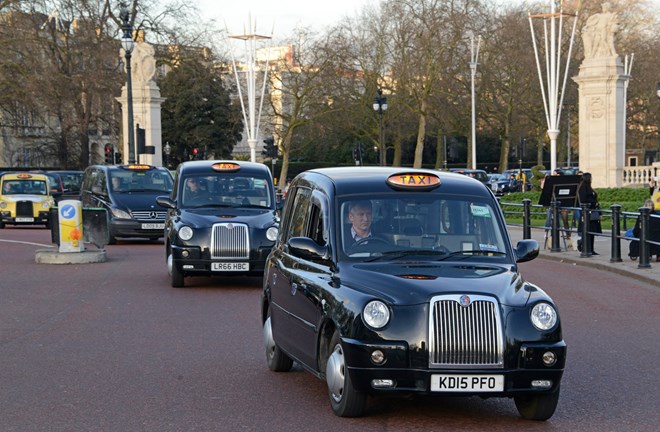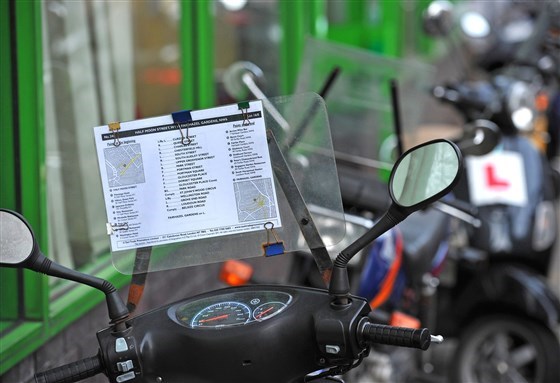
Wednesday June 27, 2018
by Rachel Elbaum
"All the years you put in, all the studying, then [new technology] comes along and your experience is worth nothing."

Black-cab drivers see themselves as the gold standard in the taxi trade, but have seen real incomes stagnate. IOS / AP
LONDON — When Paul Mayclim first got behind the wheel of one of
London’s iconic black cabs, he earned enough to pay his mortgage, for
his wife to stay at home with the kids, and for one vacation a year.
After
26 years, that’s no longer the case. Instead of encouraging his sons to
follow in his footsteps, he’s pushed them to go to college.
“All
the years you put in, all the studying, then [new technology] comes
along and your experience is worth nothing," Mayclim said.
This week's court case involving the ride-hailing app Uber was closely watched by many cabbies. Overwhelmingly
white working-class men, black-cab drivers see themselves as the gold
standard in the taxi trade, but they've have seen real incomes stagnate
amid the demographic and technological changes that have swept the city.
On Tuesday, a British court gave Uber a 15-month probationary license, which will allow it to continue operating in London after being stripped in September of its previous license pending appeal.
The company convinced a judge that it had made significant changes
after the local regulator declared it was not a “fit and proper”
business.Transport authorities had cited failings in Uber's approach to
reporting serious criminal offenses and background checks on drivers.
During the court hearing, Uber admitted the way it operated in London
needed to change, and accepted that the initial decision to revoke its
licence in September was correct.
Unsurprisingly,
cabbies are some of Uber’s sharpest critics. They are quick to point
out Uber’s failings, citing reports of sexual assault and other
safety-related incidents as a top reason to take black cabs instead.
Still, Uber has passionate supporters, and around 3.6 million people regularly use the service. One Change.org petition to “save Uber in London” racked up more than 850,000 signatures.
Since Uber launched in 2012, it quickly ate into black cabs' business and become a way of life for many Londoners.
“It’s
the waiting for a cab at night, not knowing if they will or will not
stop, and many will not take anything but cash,” said frequent Uber
passenger Sunny Singh, who explained that she felt black cabs often
failed to pick up people of color. “It becomes multiple layers of
difficulty and Uber cuts past it.”
There's also the appeal for Uber drivers, who don't have to take
lengthy courses or pass strenuous tests like cabbies do. Chip Radoslavov
drove for Uber from 2016 until April to make ends meet as he developed
his web business.
“No other job has the freedom of Uber,” said Radoslavov, who is originally from Bulgaria and runs the blog Uber Driver London. “If things don’t work out [with my business] I always have the Uber safe net.”
London
has seen the number of private-hire drivers in the city increase by 12
percent in the last three years to more than 113,000, 45,000 of which
are Uber drivers. Private-hire drivers do not need to take a specialized
exam and can get their license by passing an English test, as well as
background and medical checks.
 A
Knowledge exam route sheet rests on a moped in north London. They are
used by prospective cabbies to learn the city streets.Carl Court /
AFP/Getty Images file
A
Knowledge exam route sheet rests on a moped in north London. They are
used by prospective cabbies to learn the city streets.Carl Court /
AFP/Getty Images file
In contrast, becoming a driver of one of London’s nearly 21,000 black cabs is akin to getting a college degree.
Studying
for The Knowledge — an exam required for all registered black-cab
drivers — involves memorizing 25,000 streets and 100,000 landmarks.
Studying for the test involves nearly full-time study at a cost of
thousands of pounds.
However, Sat-nav has made these studies somewhat obsolete. What’s
more, black cabs’ higher fares have led to passengers' turning in their
millions to Uber.
Applications for The Knowledge plunged 43
percent in the last few years, from 1,116 in 2015 to 628 this past year,
according to the transport authority Transport for London.
With
falling passenger numbers and rising costs, black-cab drivers say that
they are working longer hours to make the same amount of money they did
years ago.
The rivalry between black cabs and private-hire drivers also
highlights the differences in their backgrounds. While black-cab drivers
are largely white, according to official numbers, private hire-vehicles
are often staffed by immigrants and people of color.
Courtney
Connell, who was born in London and raised in Barbados, told NBC News
that although the majority of cabbies are white men, the industry is in
no way closed to others.
“The Knowledge is open to everybody. The only thing that stops people is not wanting to put the time in to study,” he said.
Connell,
who took The Knowledge 25 years ago, says he was Transport for London’s
first black Knowledge examiner. Until this past January, he also ran a
school teaching The Knowledge to prospective drivers and eagerly showed
off photos of his multi-racial classes.
Despite the industry's
troubles, getting the "green badge" that black-cab drivers wear around
their necks after passing The Knowledge is a real point of pride. After
all, around 70 percent of prospective drivers drop out of their studies
before finishing.
“This isn’t just a job, it’s a lifestyle,” said Gert Kretov, who
works part-time as a cabbie and also co-runs the Knowledge Point School,
training future drivers.
Cafes
that cater to cabbies are social clubs in themselves, with drivers
meeting up dailyfor a bite to eat and a cup of tea. Indeed, camaraderie
and the ability to make your own schedule are often cited as the main
perks of the job.
Despite the troubles facing London's black-cab
drivers,Kretov believes that more private-hire drivers will make an
effort to get the green badge if Uber faces tougher regulation.
"All
we want is fair competition," Mayclim said, adding that Uber drivers
aren't restricted to a particular vehicle and the company can charge
what it likes, undercutting black cabs. "What we've got at the moment is
not fair."